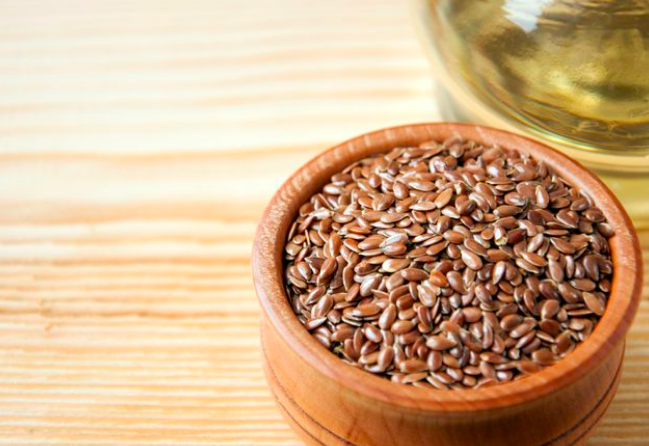Fish oil is one of the most popular, all-around beneficial supplements. Studies have proven that supplementing one’s diet with Omega-3 fatty acids—particularly EPA and DHA—improves people’s moods.Some people, particularly those who prefer a plant-based diet, take flax oil instead, as it also contains Omega-3 fatty acids. That said, is flax oil as effective as fish oil for improving mood?Which is the superior oil?
Recently, the Canadian Network for Mood and Anxiety Treatments noted that Omega-3 fatty acid supplements were effective in treating mild to moderate depression [2]. These antidepressant effects come into play due to serotonin transmission in the brain being modified. There’s also an overall reduction of brain inflammation[3, 4]. It’s likely that inhibiting oxidative stress and mitochondrial dysfunction are also contributing factors to Omega-3s’ antidepressant effects [5].
Studies have also found that estrogen on its own can act as an antidepressant, and that these effects are synergized by Omega-3 fatty acids. This may be why most women feel emotionally well after their period has finished up until the mid-cycle when estrogen levels rise. It’s also why so many women feel terrible during perimenopause when estrogen (and progesterone) begin to drop off.
Different Types of Fatty Acids and How They Work On Mood
Up until now, there have been no studies breaking down the different types of Omega-3 fatty acids and how they combine in the presence of estrogen (in women) to impact mood. In terms of where these fatty acids are sourced,ALA is found primarily in flax, whileEPA and DHA are found primarily in fish oil.
This studywas completed with menopausal rats and so is not directly applicable to humans. It is generally thought, however, that rats are a good model for brain/hormonal health in humans. The rats were given estrogen to ascertain the effect of the hormones separately from the Omega fatty acids.
The rats were divided into three groups:
- Those on a control diet
- Those who were given flax oil diets (ALA)
- And those on a fish oil (EPA/DHA) diet
The control diet had 0.05 percent of Omega-3 PUFAs, and the ALA (flax), EPA/DHA (fish oil) diets had 6.40 percent of ALA, 6.35 percent of EPA, and 6.35 percent of DHA in total fatty acids, respectively.
Results found that rats that were given estrogen had 12 percent lower body weight.Supplementation with flax oil and fish oil increased the level of the types of fatty acids they contain in the rats’ brains.Compared to flax, the fish oil increased levels of the brains’ beneficial phospholipids the most.
Behavioural Changes
Estrogen increased overall activity levels by 62 percent, and serotonin levels by 34 percent, regardless of diet.Supplementation with fish oil, (EPA/DHA) increased serotonin by 29 percent. Interestingly, flax oil did not have this effect.Supplementation of fish oil also decreased PGE2 (inflammatory cytokine) levels in the brain by 37 percent. Flax and estradiol did not. Fish oil also decreased other inflammatory cytokines like TNF-alpha.
The researchers also found that there was beneficial modulation of brain-derived neurotrophic factor( a compound that works to support brain health)and the production of serotonin with the fish oil, and not the flax.
Related:Omega 3, Vitamin E, and Mood in PCOS
Why Is Flax Less Effective Than Fish Oil?
Reasoning : why doesn’t flax help when it converts into EPA and DHA?
ALA from flax converts into EPA and DHA in a dose-dependent manner [37]. Antidepressant effects of ALA are only observed in diets with high doses of ALA, which increased body levels of EPA and DHA to levels achieved by diets with EPA and DHA supplementation. This suggests that the antidepressant effect of ALA could be due to its conversion to EPA and DHA, but not due to the ALA itself.
In a nutshell, in order to achieve noticeable antidepressant effects with flax oil, you’d have to take so much that it wouldn’t be practical to do so. A high-quality fish oil is a much better choice. If you do go this route, note that fish oil in triglyceride form is considered to be the best type for optimal absorption.
Article References:
- Choi Jeongeun, Park YongsoonEPA and DHA, but not ALA, have antidepressant effects with 17β-estradiol injection via regulation of a neurobiological system in ovariectomized ratsThe Journal of Nutritional Biochemistry (2017)2017;
- Ravindran AV, Balneaves LG, Faulkner G, Ortiz A, McIntosh D, Morehouse RL, Ravindran L, Yatham LN, Kennedy SH, Lam RW, MacQueen GM, Milev RV, Parikh SVCanadian Network for Mood and Anxiety Treatments (CANMAT) 2016 Clinical Guidelines for the Management of Adults with Major Depressive Disorder: Section 5. Complementary and Alternative Medicine TreatmentsCan J Psychiatry2016;61(9):576-87.
- Jin Y, Park YN-3 polyunsaturated fatty acids and 17beta-estradiol injection induce antidepressant-like effects through regulation of serotonergic neurotransmission in ovariectomized ratsJ Nutr Biochem2015;
- Park Y, Moon HJ, Kim SHN-3 polyunsaturated fatty acid consumption produces neurobiological effects associated with prevention of depression in rats after the forced swimming testJ Nutr Biochem2012;23(8):924-928.
- de Mello AH, Gassenferth A, Schraiber Rde B, Souza Lda R, Florentino D, Danielski LG, Cittadin-Soares Eda C, Fortunato JJ, Petronilho F, Quevedo J, Rezin GTEffects of omega-3 on behavioral and biochemical parameters in rats submitted to chronic mild stressMetab Brain Dis2014;29(3):691-9.


